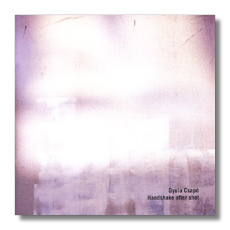
The Internet's Premier Classical Music Source
Related Links
- Latest Reviews
- More Reviews
-
By Composer
-
Collections
DVD & Blu-ray
Books
Concert Reviews
Articles/Interviews
Software
Audio
Search Amazon
Recommended Links
Site News
 CD Review
CD Review
Gyula Csapó

- Handshake After Shot
- Hark, Edvard, . . – hommage à Grieg
- Sutræcitations
- Krapp's last tape – after Samuel Beckett
- BirdDayCage
Various performers
Budapest Music Center BMCCD013 DDD? 72:26
"[John] Cage told me that this piece [Handshake After Shot] appealed to him most in the entire programme. Delighted and embarrassed, I asked him to tell me what he liked about it, whereupon he said: "the way it sounded." The answer, of course, is pure Cage, and it says as much about him as it does about Hungarian composer Gyula Csapó. One might say that "the way it sounded" is the only thing that matters about a piece of music. One might say, with equal validity, that it does not matter at all, not even to Cage. The five pieces on this CD are moving targets on the continuum between these two extremes, and the listener might take aim at a duck, for example, only to find that he has hit a swan.
It is good to get a glimpse of Hungary's avant-garde. Csapó was born in 1955 and received most of his early musical training in that country. While in his late twenties, he studied computer music in Paris at I.R.C.A.M. And, tellingly, received his doctorate following studies in the United States with Morton Feldman. Feldman called him "one of the most brilliant composers I have met"; Cage's approval already has been noted.
Hark, Edvard… hommage à Grieg is the most overtly Feldmanesque work on this CD… but only because of the way it sounds. Scored for two Hungarian dulcimers (cimbaloms?), piano, and double bass, it is a 20-minute X-ray of the harmonic structure of some of Edvard Grieg's Lyric Pieces, Csapó's exquisite sensitivity to timbre and overtones has created a work that is luminously quiet and sensual. Although he used a process based, in part, upon "statistical tonality" to compose this hommage, the proof, as they say, is in the pudding. The other notably beautiful work on this disc is Sutræcitations, which is scored for tenor, three clarinets, amplified piano sounds, amplifier, loudspeakers, tuned glasses, and "unidentified sources of noise." The English text is from the Buddhist Avatamsaka Sutra, As the work progresses, the text is fragmented as it is repeated, in subtle parallel to the meaning (or a meaning) of the text itself. Through amplification and loudspeakers, the singer's voice vibrates the open piano strings. In these two works, these brief descriptions give only the barest idea of the many functional layers that are present. The means never overwhelm the ends.
The third of the larger works doesn't work as well on CD because it has a prominent visual element. Krapp's Last Tape was inspired by Samuel Beckett's work of the same name, although it is not a "setting" of it, at least not in the usual sense. A "violinist-actor" competes with a pre-recorded tape of himself, and also records and plays himself back in concert. Four spotlights also have an important role. Obviously this is one for the DVD medium, but enough of the play on time, reality, and representation survives on CD for this recording to be of interest.
Short works bracket the larger ones. Handshake After Shot and BirdDayCage (a birthday piece for the 76-year-old Cage) are effective, terse, and curiously moving. Csapó's influences are clear, but he speaks his own language.
The performances, mostly by Hungarian composers, are excellent, as is the engineering. The presentation by Budapest Music Center (or BMC) is very attractive.
Copyright © 2001, Raymond Tuttle


















